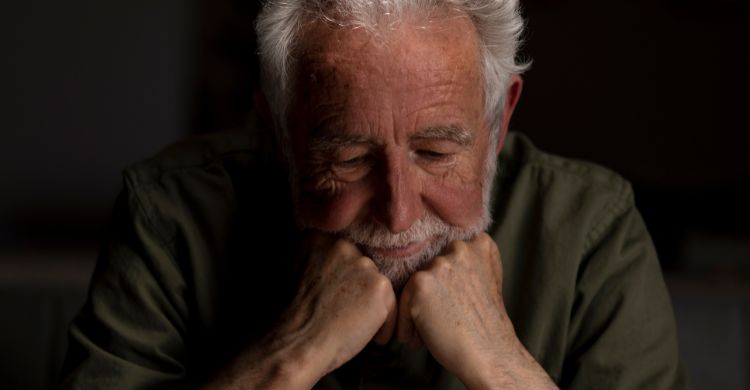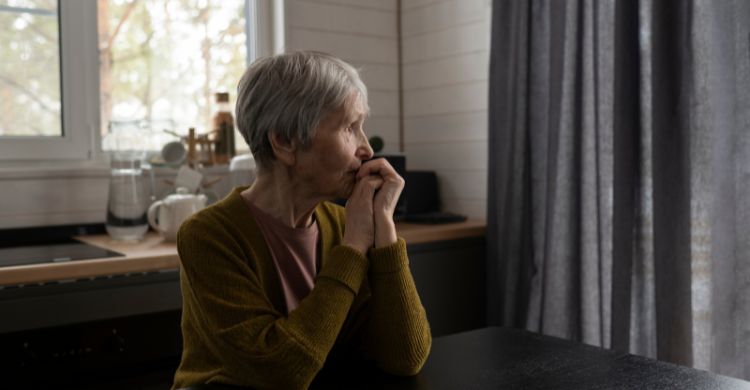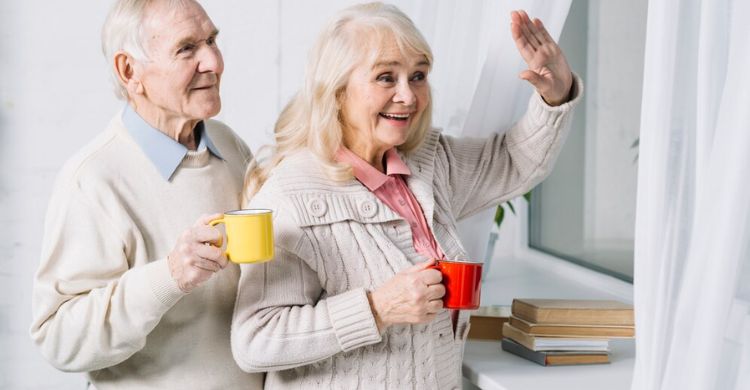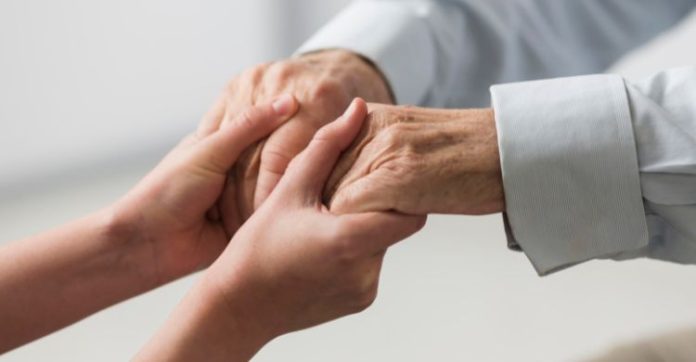Have you ever wondered why our elders, who have endured so much, might still feel down or anxious? This topic often goes unnoticed, but it’s a real issue that many older adults face.
Anxiety and depression in seniors or older adults can significantly impact their quality of life. It leads to physical health problems, social isolation, and even an increased risk of suicide.
In this blog, we will explore the signs and symptoms of depression in elderly, discuss the causes, and offer advice on how to support loved ones who may be struggling. Let’s shed light on this critical issue and help older adults find their needed support.
Understanding Depression in Elderly (Older Adults)
An older person may be depressed if they feel low in energy, extremely sad, loss of appetite, or lose interest or pleasure in their usual activities over a long period. It’s crucial to note that not everyone who experiences these symptoms is depressed.
However, it’s equally important to be vigilant, as not every individual who’s suffering from geriatric depression will experience all of these symptoms. Recognizing these signs makes a considerable difference in the life of an older adult.

Further, it’s important to recognize that depression in seniors may present with more physical symptoms. For instance, they may complain about difficulty sleeping rather than low mood or sadness. Identifying these physical symptoms can help you spot potential signs of depression in older adults.
When an older adult describes their depression, it’s essential to listen with patience and empathy. They may use different language, such as talking about their ‘nerves’ instead of ‘sadness.’ Understanding their unique expression of depression can help you connect with them on a deeper level.

Symptoms of Elderly Depression
Let’s know about the different signs and symptoms of depression in elderly:
Physical Symptoms of Elderly Depression
- Sleeping less or more than usual
- Change or loss of appetite
- Feeling tired all the time
- Memory problems
- Slowed movement
- Significant weight loss or weight gain
- Digestive upsets or changes in bowel habits
- Headaches, backaches, or similar complaints
- Pacing, agitation, or hand-wringing
Behavioral Signs of Elderly Depression
- Experience restlessness or slowing down
- Withdrawing from family and friends
- A decline in daily functions, worrying, confusion, and agitation
- Neglecting responsibilities and self-care
- Inability to find pleasure in any activity
- Difficulty motivating themselves
- Out-of-character behavior
- Denial of feelings of depression as a defense mechanism
Types of Thoughts in Seniors With Depression
- Loss of self-esteem
- Negative thoughts
- Persistent suicidal thoughts
- Excessive concerns over finance
- Indecisiveness
- Perceived feelings of a change in their status within the family
Types of Feelings in Seniors With Depression
- Irritability and moodiness
- Hopelessness, sadness, and emptiness
- Feelings of being overwhelmed
- Feeling guilty or worthless
Suggested: Beyond Age: The Unmatched Wisdom of Older People
Anxiety in Seniors
It’s important to note that the symptoms of anxiety in older adults often develop gradually. Given that we all experience some anxiety at some point in time, it can be challenging to discern when it’s a cause for concern. This understanding underscores the audience’s role in providing proper support, as older adults with anxiety will experience a range of symptoms.
Here, we have categorized the symptoms of anxiety in older adults into similar groups used to describe depression. This categorization can aid in better understanding and management of these symptoms.
Behavioural Signs of Anxiety in Seniors
- Avoiding situations or objects that cause anxiety
- Avoiding eye contact
- Startling easy
- Difficulty in decision-making
- Urgers to perform specific rituals in a bid to relieve anxiety
Feelings
- Feeling overwhelmed
- Fear when facing particular situations, objects, or events
- Worried about physical symptoms
- Strong feelings of dread
- Constantly feeling nervous and tense
- Uncontrollable or overwhelming feelings of panic
Thoughts
- Thoughts making them go crazy
- Thoughts that they can’t control themselves
- Thoughts that they are going to die
- Thoughts that people are judging them
- Upsetting flashbacks or a traumatic event
- Invasive thoughts that are difficult to ignore
Physical symptoms
- An increase in the heart rate
- Tension and pain in the muscle
- Numbness or tingling in the feet and hands
- Difficulty sleeping
- Vomiting, nausea, or pain in the stomach
- Feeling detached from physical surroundings or self
- Sweating and shaking
- Hot or cold flushes
- Feeling dizzy, lightheaded, or faint

Causes of Anxiety and Depression in Elderly
Depression and anxiety, complex mental illnesses, can be better understood when we explore their triggers. In the below section, we delve into some of the most common causes of depression in seniors, empowering you with the knowledge to support your loved ones better.
Causes of Depression in Elderly People
It’s important to recognize that social isolation and loneliness are not just feelings but significant causes of clinical depression in older adults.
As seniors gradually lose their social networks due to various life changes, including the death of their spouses, retirement, and illness, they may find building and maintaining social connections challenging.
This understanding can help us empathize with their situation and take steps to alleviate their loneliness.
Other possible causes of depression in older adults are:
- Disruptive life changes
- Providing care for a spouse
- Physical health conditions
- Sleep disorders
- Family history of clinical depression
- Inadequate exercise
Moreover, medications alter brain chemistry. This causes depression as a side effect. Common drugs that are linked to depression include certain beta-blockers, anticonvulsants, corticosteroids, and statins.
Causes of Anxiety in Elderly People
Like depression, anxiety in the older group is frequently caused by loneliness. Humans are wired for connection, and a lack of meaningful relationships can exacerbate anxiety and stress.
Seniors with cognitive impairments are especially vulnerable to developing anxiety due to social isolation. As caregivers, healthcare professionals, and family members, your support and understanding are crucial in helping them cope.
Anxiety has many other causes, such as:
- Stressful life events, such as moving to a new home or losing a job
- Financial instability
- Chronic medical disorders
- Irregular sleep
- Lack of mobility
- Illness or fears of developing illness
- Alcohol consumption
- Certain medications, including antidepressants, inhalers, steroids, and stimulants
Must Read: “You Are Never Too Weak and Old.” Breaking Mind Barriers With Dr N Ganesh Rao
Effects of Depression on Seniors
Depression and anxiety affect more than mood, which impacts various aspects of seniors’ health, causing their overall quality of life to decline. Below are some common effects your loved one may experience:
Physical Effects of Geriatric Depression
Although anxiety and depression often have no physical symptoms, they affect the body. Poor mental health in the elderly has been linked to the following conditions:
- Cardiovascular Disease: Depression and anxiety increase BP, heart rate, and cortisol levels, causing heart disease and calcium blockages in the arteries.
- Gastrointestinal Disorders: Stress due to depression and anxiety causes the body to release hormones and neurotransmitters. These chemicals disrupt digestion and bacteria levels in the stomach, which causes gastrointestinal disorders.
- Inflammation: Chronic stress due to anxiety increases inflammation levels, which reduces the body’s ability to fight infection.
Emotional Effects of Geriatric Depression
Mental illness too impacts seniors’ emotions directly, causing effects like:
- Emotional Dysregulation: For older adults, it becomes difficult to self-regulate their emotions because of depression and anxiety. This causes mood swings and irritability.
- Emotional Blunting: Depression decreases seniors’ ability to feel positive and negative emotions.
Social Effects of Geriatric Depression
Depression and anxiety make it difficult for the elderly to form and maintain social connections. Also, those who are depressed tend to spend time with other depressed individuals, worsening their symptoms.
Treating Elderly Depression
Like physical disease, anxiety and depression don’t miraculously go away on their own. Rather, these conditions need treatment from skilled healthcare professionals. Common depression treatment in the elderly include:

Medication
Antidepressant medications like Wellbutrin, Prozac, and Zoloft have been shown to significantly minimize symptoms of depression in 70% to 80% of people. These medications also effectively treat anxiety disorders, offering a ray of hope in the treatment journey.
Therapy and Counseling
A combination of medication and psychotherapy helps seniors develop resiliency and treat anxiety and depression. One well-known treatment for these conditions is cognitive behavioral therapy, where patients develop coping skills and alter unhealthy thought patterns.

Lifestyle Changes
A healthy lifestyle improves psychological well-being in seniors. Frequent exercise and a nutritious diet prevent or treat anxiety or depression. Moreover, spending time in nature, owning a pet, and reducing social media usage boosts mental health.
Support Groups
Most healthcare providers and retirement communities organize virtual or in-person support groups for older with anxiety and depression. These meetings provide older adults with a safe place to talk about their emotions and reduce feelings of isolation.
Finding the proper treatment may take multiple tries. Don’t get discouraged if your loved one doesn’t see quick results.
Join Specialized Programs on Yoga for Senior Citizens.
How to Help an Older Adult with Depression and Anxiety?
Seeing your loved one struggle with anxiety or depression is heart-wrenching and stressful. Some ways that you can support them include:
- Research Senior Living Communities: Retirement communities allow elders to socialize with their peers and stay physically and mentally active. Find retirement communities that fit the requirements of your loved one so that they feel less socially isolated.
- Recognize Symptoms: Often, older adults don’t realize they have mental health issues. Gently revealing symptoms of depression or anxiety may prompt them to seek help.
- Practice Effective Communication: Frequent and clear communication with your loved one helps lessen feelings of isolation. This encourages them to talk about their thoughts and emotions.
- Encourage Self-Care: Simple acts of self-care make a significant difference in managing stress and regulating moods. Inviting your loved one for a short walk or giving them a gratitude journal shows them their well-being is a priority.
- Provide Emotional Support: Listening to your loved one and giving reassurance help them better cope with their depression or anxiety.
- Locate Treatment Options: Anxiety and depression make it challenging for seniors to pursue treatment. Help them by researching therapists covered by their insurance and arranging appointments.
How Can Older Adults Protect Their Mental Health?
In general, depression can’t be prevented. However, there are steps you can take to help boost the mental wellness and emotional resilience of your loved one:
Get Enough Sleep
Getting plenty of restful sleep is key for older adults. Lack of sleep can cause depressed feelings and irritability.
Stay Active
Exercise improves mood and strengthens the heart and lungs. Activities like brisk walking, swimming, and light yard work are great for older adults.
Be Social
Seniors are at greater risk for social isolation and loneliness, which contribute to depression. Stay in touch with friends and family to keep those connections alive. Visit the local senior center to see what programs and activities they offer.
Eat Right
Older adults have unique nutrition needs, so a healthy, balanced diet is key. Eating well can help you have more energy and prevent medical conditions that may indirectly increase your risk for depression.
Promote Mental Well-Being With Healthy Aging
Anxiety and depression affect many seniors. However, they are not an inevitable part of aging. Elders can reduce their risk of developing these disorders by adopting healthy lifestyle habits, such as exercising daily, eating a balanced diet, and participating in mentally enriching activities.
Further, joining a retirement community prevents or treats anxiety and depression, promoting healthy aging. A communal living environment allows residents to engage with peers and form meaningful relationships, minimizing social isolation.
Join the Geriatrics Yoga Program by hellomyyoga.
Conclusion
Depression and anxiety in older adults are complex but not uncommon challenges that deserve our full attention. Older adults can improve their mental well-being and quality of life with the proper treatment—whether it’s therapy, medication, or lifestyle changes. It’s important to foster open conversations, reduce stigma, and ensure older adults feel supported as they navigate these difficult emotions.



